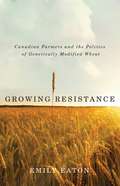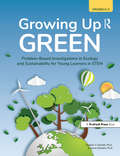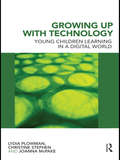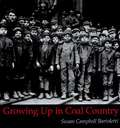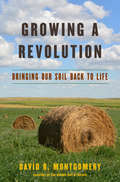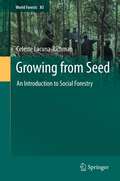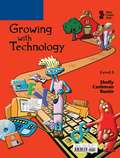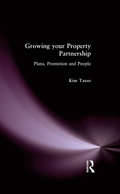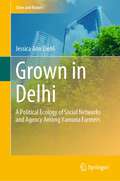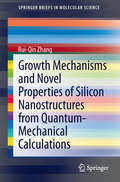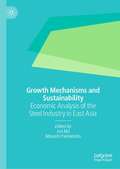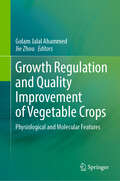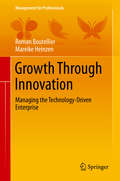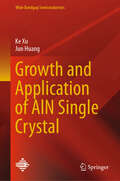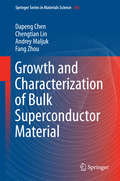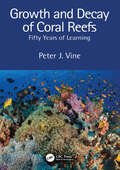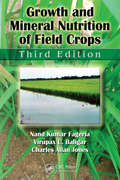- Table View
- List View
Growing Moral Relations
by Mark CoeckelberghNew scientific and technological developments challenge us to reconsider our moral world order. This book offers an original philosophical approach to this issue: it makes a distinctive contribution to the development of a relational approach to moral status by re-defining the problem in a social and phenomenological way.
Growing Peace: A Story of Farming, Music, and Religious Harmony
by Richard SobolThis stunning photo-essay for children is a story of coexistence, focusing on Jewish, Muslim, and Christian families in a Ugandan village who created a Fair Trade Coffee Cooperative and learned to live and work together peacefully.On the morning of September 11, 2001, J. J. Keki, a Ugandan musician and coffee farmer, was in New York, about to visit the World Trade Center. Instead, J.J. witnessed the terrorist attack on the Twin Towers. He came away from this event with strong emotions about religious conflict. Why should people be enemies because of their religions? Back home in his village, J.J. was determined to find a way for people who held different religious beliefs to work together. He saw that the neighborhood children, from Jewish, Muslim, and Christian families, played with one another without a care about religion. Why not enlist their parents, all coffee farmers like himself, in a cooperative venture around a shared goal? Together they would grow, harvest, and sell their coffee. At the same time, they would bridge religious differences to work and live together peacefully. Here is a rare and timely story of hope, economic cooperation, and religious harmony from an often struggling part of the world. From J.J.'s vision, his community has achieved what many people strive for: a growing peace.
Growing Resistance: Canadian Farmers and the Politics of Genetically Modified Wheat
by Emily EatonIn 2004 Candian farmers led an international coalition to a major victory for the anit-GM movement by defeating the introduction of Monsanto's genetically modified wheat. Canadian farmers' strong opposition to GM wheat marked a stark contrast to previous producer acceptance of other genetically modified crops. By 2005, for example, GM canola accounted for 78 percent of all canola grown nationally. So why did farmers stand up for wheat? In Growing Resistance, Emily Eaton reveals the motivating factors behind farmer opposition to GM wheat. She illustrates wheat's cultural, historical, and political significance on the Canadian prairies as well as its role in crop rotation, seed saving practices, and the economic livelihoods of prairie farmers. Through interviews with producers, industry organizations, and biochemical companies, Eaton demonstrates how the inclusion of producer interests was integral to the coalition's success in voicing concerns about environmental implications, international market opposition to GMOs, and the lack of transparency and democracy in Canadian biotech policy and regulation. Growing Resistance is a fascinating study of successful coalition building, of the need to balance local and global concerns in activist movements, and of the powerful forces vying for control of food production.
Growing South African Indigenous Orchids
by Karsten WodrichProviding a guide to the cultivation of both the terrestrial and epihytic orchid species growing in South Africa, this volume includes numerous hints, illustrations and photographs to help simplify the process. Detailed growing notes are given for over 60 terrestrial and over 40 epiphytic species.
Growing Up Green: Problem-Based Investigations in Ecology and Sustainability for Young Learners in STEM (Grades K-2)
by Stephen T. Schroth Janese DanielsGrowing Up Green allows young students (grades K-2) to build critical and creative thinking skills, while also improving skills in science, technology, engineering, and mathematics (STEM). The book:Includes 10 problem-based investigations that explore sustainability and environmental concerns.Covers topics such as reducing one's carbon footprint, developing green manufacturing processes, initiating a recycling program, and more.Is perfect for general education classrooms, single- or multi-grade gifted classrooms, or pull-out programs.Features crosscurricular connections.Includes a list of apps, websites, and books that can be used to increase students' understanding and curiosity.Each investigation includes comprehensive teacher instructions, ideas for differentiation, hands-on student activities, reproducible student resources, reflection opportunities, and assessment options. The engaging investigations guide learners through the process of identifying problems, developing research questions, gathering and analyzing data, developing possible solutions, and disseminating information to others.Grades K-2
Growing Up With Technology: Young Children Learning in a Digital World
by Christine Stephen Lydia Plowman Joanna McPakeGrowing Up with Technology explores the role of technology in the everyday lives of three- and four-year-old children, presenting the implications for the children’s continuing learning and development. Children are growing up in a world where the internet, mobile phones and other forms of digital interaction are features of daily life. The authors have carefully observed children’s experiences at home and analysed the perspectives of parents, practitioners and the children themselves. This has enabled them to provide a nuanced account of the different ways in which technology can support or inhibit learning. Drawing on evidence from their research, the authors bring a fresh approach to these debates, based on establishing relationships with children, families and educators to get insights into practices, values and attitudes. A number of key questions are considered, including: Which technologies do young children encounter at home and preschool? What kind of learning takes place in these encounters? How can parents and practitioners support this learning? Are some children disadvantaged when it comes to learning with technology? Growing Up with Technology is strongly grounded in a series of research projects, providing new ways of thinking about how children’s learning with technology can be supported. It will be of great interest to undergraduate and postgraduate students on a range of courses including childhood studies, and those with a particular interest in the use of technology in education. Parents, practitioners and researchers will also find this a fascinating and informative read.
Growing Up in Coal Country
by Susan Campbell BartolettiThrough interviews, newspaper accounts, and other original sources, Bartoletti pieced together a picture of life in the Pennsylvania coal mines at the turn of the century.
Growing a Revolution: Bringing Our Soil Back To Life
by David R. MontgomeryFinalist for the PEN/E. O. Wilson Literary Science Writing Award “A call to action that underscores a common goal: to change the world from the ground up.”—Dan Barber, author of The Third Plate For centuries, agricultural practices have eroded the soil that farming depends on, stripping it of the organic matter vital to its productivity. Now conventional agriculture is threatening disaster for the world’s growing population. In Growing a Revolution, geologist David R. Montgomery travels the world, meeting farmers at the forefront of an agricultural movement to restore soil health. From Kansas to Ghana, he sees why adopting the three tenets of conservation agriculture—ditching the plow, planting cover crops, and growing a diversity of crops—is the solution. When farmers restore fertility to the land, this helps feed the world, cool the planet, reduce pollution, and return profitability to family farms.
Growing and Sustaining Student-Centered Science Classrooms
by David StroupeA wealth of practical tools and guidance for rooting out injustice and creating science learning spaces in which students feel valued, safe, and eager to engage.In Growing and Sustaining Student-Centered Science Classrooms, David Stroupe promotes powerful conversation and action around knowledge-building practices in science education. The book takes readers into inspiring classroom communities in which all students are invited and encouraged to engage in the work of science. An illuminating series of real-time classroom scenes demonstrate flexible teaching approaches and instructional pivots that Stroupe calls talk moves and shows how they foster inclusive collaboration and participation to create a more expansive, and better, version of science education.Even as Stroupe champions student-centered science education, he acknowledges that common obstructions to knowledge sharing, or epistemic injustices, can often prevent this student-led ideal from materializing. He calls attention to four types of injustices that frequently stifle student voice and access in science learning communities: testimonial injustice, hermeneutical injustice, intrapersonal injustice, and hierarchical injustice. Recounting real-life examples of these individual and systemic injustices, Stroupe gives educators the tools to both identify and eradicate them.This thought-provoking book sets forth ambitious tactics for educators to audit assumptions and biases in science, promote student agency, and conduct action research to document change. Using Stroupe's accessible methods, teachers, teacher educators, and administrators can design immediate and long-term instructional practices to disrupt injustices in STEM classroom communities and support student learning.
Growing from Seed
by Celeste Lacuna-RichmanSocial Forestry and its most well-known variant, Community Forestry, have been practiced almost as long as people have used forests. During this time, forests have provided people with countless goods and services, including wood, medicine, food, clean water and recreation. In making use of forest resources, people throughout history have frequently organized themselves and established both formal and informal rules. However, just as the discipline of Forestry had previously limited and concentrated the function of forests to the timber it provides, the popular understanding of Social Forestry has restricted it to a Forestry sub-topic that deals with welfare, without any connection to income-generation, and is practiced only in developing countries. This volume introduces the concepts of Social Forestry to the student, gives examples of its practice around the world and attempts to anticipate developments in its future. It aims to widen the concept of Social Forestry from a sub-practice within Forestry to a practice that will make Forestry relevant in countries where wood production alone is no longer the main reason for keeping land forested, thereby rediscovering and redefining this important topic.
Growing with Technology (Level #2)
by Gary B. Shelly Thomas J. Cashman Rachel Biheller BuninGrowing with Technology introduces elementary-aged children to the basics of computers and computer applications. The texts are organized into eight chapters that cover: Computer Foundations, Keyboarding, Word Processing, Networks and the Internet, Creating Graphics, Presentation Software, Spreadsheets and Databases.
Growing with Technology (Level #3)
by Gary B. Shelly Thomas J. Cashman Rachel Biheller BuninThe computing fundamentals program is designed to prepare elementary students for a future using technology.
Growing with Technology (Level #4)
by Gary B. Shelly Thomas J. Cashman Rachel Biheller BuninGrowing with Technology introduces elementary-aged children to the basics of computers and computer applications. The texts are organized into eight chapters that cover: Computer Foundations, Keyboarding, Word Processing, Networks and the Internet, Creating Graphics, Presentation Software, Spreadsheets and Databases.
Growing with Technology (Level #5)
by Gary B. Shelly Thomas J. Cashman Rachel Biheller BuninThe computing fundamentals program is designed to prepare elementary students for a future using technology.
Growing your Property Partnership: Plans, Promotion and People
by Kim TassoBeing the best agent or surveyor does not always mean that you will be the best manager or leader. But being an agent, surveyor or other property professional probably means that you are averse to taking time out to learn about management. This book is a pragmatic introduction to alternative growth strategies and management solutions in planning, leadership, human resources, strategic marketing, promotion, selling, "clientology" (relationship management) and achieving change. It is packed with ideas and checklists to spur you along with guidance on: analysis, motivation, networking, branding, service development, persuasion, project management, rapport, tendering and an A-Z of promotional tools. The book tackles many of the key issues faced by those who manage and direct their professional firms, from preparation of business plans, to leadership strategies and client relationship management.
Grown in Delhi: A Political Ecology of Social Networks and Agency Among Yamuna Farmers (Cities and Nature)
by Jessica Ann DiehlThis book explores how power relationships, measured through qualitative social network analysis, impact planning participation and livelihood strategies of a marginalized group of farmers cultivating the Yamuna River floodplain in Delhi, India. Through an in-depth study of 165 farming households facing land development, this book offers insights from the ground-up into how social dynamics enable and constrain agency. A novel mixed-methods approach was used to measure social networks and access to resources based on the different types of people farmers might interact with as part of their livelihoods: hired laborers, vendors, other farmers, etc. Digging deeper into social network patterns, typologies of power are illustrated as they manifest household agency through diverse pathways. More broadly, a political ecology lens is used to link together the multiple and fragmented Yamuna farmers’ stories with broader social, ecological, infrastructural, and economic contexts to suggest future directions for inquiry and policy related to localized urban food systems and sustainable development. This monograph will be of interest to academic faculty and graduate students in critical geography, cultural anthropology, food studies, landscape architecture/urban planning, and sociology.
Growth Mechanisms and Novel Properties of Silicon Nanostructures from Quantum-Mechanical Calculations
by Rui-Qin ZhangIn this volume, Prof. Zhang reviews the systematic theoretical studies in his group on the growth mechanisms and properties of silicon quantum dots, nanotubes and nanowires, including: mechanisms of oxide-assisted growth of silicon nanowires, energetic stability of pristine silicon nanowires and nanotubes, thermal stability of hydrogen terminated silicon nanostructures, size-dependent oxidation of hydrogen terminated silicon nanostructures, excited-state relaxation of hydrogen terminated silicon nanodots, and direct-indirect energy band transitions of silicon nanowires and sheets by surface engineering and straining. He also discusses the potential applications of these findings. This book will mainly benefit those members of the scientific and research community working in nanoscience, surface science, nanomaterials and related fields.
Growth Mechanisms and Sustainability: Economic Analysis of the Steel Industry in East Asia
by Jun Ma Masashi YamamotoThis book provides a broad investigation of various issues in East Asia’s steel industry since the 1980s, including international specialization and trade relations, the sustainable use of resources, technological innovations, and environmental mitigation, alongside a consideration of the rapid growth in Chinese steel industry. Using macro and firm-level data, and case studies based on field research to discuss issues concerning the steel industry in East Asia. In search of an easy understanding, we try to simplify complicated economic models and statistical analyses, and concentrate on policy implications based as much as possible on the results of empirical analyses. We believe that this book will be of interest to policymakers, economists, practitioners and advocates of sustainability.
Growth Regulation and Quality Improvement of Vegetable Crops: Physiological and Molecular Features
by Golam Jalal Ahammed Jie ZhouThis book compiles the latest advancements in vegetable crop growth, development, and quality improvement with potential implications for sustainable crop production. It covers aspects of light quality regulation, CO2 enrichment, beneficial microorganisms, epigenetic regulation, and perspectives on carbon-neutral protected vegetable production. Through this book, readers will gain new insights into the mechanisms of growth regulation, quality improvement, and stress tolerance in vegetable crops, encompassing the most recent biochemical, physiological, and molecular studies. The chapters cover topics such as seed germination processes, root trait regulation for defense mechanisms, essential nutrient management for optimal growth, stomatal function dynamics in vegetables, fruit development pathways, secondary metabolism roles in quality enhancement, abiotic stress response strategies, biotic stress resistance mechanisms, and post-harvest physiology in vegetable crops. The book provides a thorough examination of climate-smart technologies aimed at ensuring sustainable vegetable production amidst global climate change challenges. It addresses critical topics like food safety through detoxification of pesticide residues and explores innovative approaches such as hormonal regulation techniques, nanotechnology, the use of growth regulators, biostimulants, and grafting to enhance growth and stress tolerance in vegetables. This volume is an indispensable resource for professionals in olericulture, horticulture, and plant sciences. Researchers and advanced university students will find it particularly valuable for its comprehensive coverage of vegetable crop growth and quality improvement. The book's focus on sustainable agricultural practices makes it a must-read for anyone committed to addressing global food security challenges in the context of climate change.
Growth Through Innovation
by Roman Boutellier Mareike HeinzenCapitalism produced entrepreneurs and property rights, the two basic pillars of innovation and growth. As the speed of technology is steadily increasing only radical innovation can be the name of the game. This book discusses technology and innovation trends by looking into historical examples and telling the latest business stories. It opens the discourse about pirates, pioneers, innovators and imitators; proposes the framework of dominant, science-driven and high-tech industry for innovation management and gives insights into intellectual property rights, industrial designs and technical risk management. Finally, it offers 8 important innovation principles for technology driven enterprises that have turned out to have a big effect on the outcome - and in the end on growth.
Growth and Application of AlN Single Crystal (Wide Bandgap Semiconductors)
by Ke Xu Jun HuangThis book covers the rapidly developing field of AlN research and some of its technical applications. In this book, the development of aluminium nitride from single crystal growth to device applications is comprehensively presented. Single crystal AlN growth includes bulk single crystal growth, single crystal thick film growth and single crystal thin film growth involving physical vapor deposition technology, hydride vapor phase epitaxy and metal-organic chemical vapor deposition technology. In terms of devices, AlN basic UV LED and power electronics devices are discussed. This book can provide researchers, engineers and graduate students with a wealth of new discoveries, results, information and knowledge in the field of AlN single crystal materials.
Growth and Characterization of Bulk Superconductor Material
by Dapeng Chen Chengtian Lin Andrey Maljuk Fang ZhouThis book focuses on recently developed crystal growth techniques to grow large and high quality superconducting single crystals. The techniques applied are traveling solvent floating zone (TSFZ) with infrared image furnace, Bridgeman, solution/flux and top seeded solution growth (TSSG) methods. The materials range from cuprates, cobaltates to pnictides including La2CuO4-based (LCO), YBa2Cu3O7-d (YBCO), Bi2Sr2Can−1CunO2n+4+δ (n=1,2,3) (BSCCO) to NaxCoO2. The modified Bridgman "cold finger" method is devoted to the pnictide system with the best quality (transition width DTc~0. 5 K) with highest Tc~38. 5 K of Ba0. 68K0. 32Fe2A2. The book presents various iron-based superconductors with different structures, such as 1111, 122, 111, 11 and 42622,10-3-8. Detailed single crystal growth methods (fluxes, Bridgman, floating zone), the associated procedures and their impact to crystal size and quality are presented. The book also describes the influence of doping on the structure and the electric, magnetic, and superconducting properties of these compounds in a comparative study of different growth methods. It describes particularly under-, optimal and over-doped with oxygen cuprates (LCO, YBCO and BSCCO) and hole/electron/isovalently doped parent compounds AFe2As2 (A = Ba, Sr, Ca) (122), chalcogenides AxFe2-ySe2(A = K, Rb, Cs) (122), and Fe1-dTe1-xSex (11). A review of the current growth technologies and future growth efforts handling volatile and poisonous components are also presented.
Growth and Decay of Coral Reefs: Fifty Years of Learning
by Peter J. VineGrowth and Decay of Coral Reefs: Fifty Years of Learning describes how coral reefs have alternately flourished and declined over the last 50 years and the dynamics of these changes. The study is based on recordings at 30 different locations along the Sudanese coast, visited by the author between 1971 and 1973. Beyond the Red Sea's desert shores lie some of the richest and most diverse coral reefs on our planet. Over a thousand species of reef fishes, matched by a similar abundance of living corals, creating habitats scientists were only just beginning to understand. The complexity of the inter-relations was truly mesmerizing. A single intervention, such as removal of a key species, could cause the whole community to collapse. Healthy corals were transformed into green weed-smothered reefs, accompanied by the loss of both corals and fish. Based on the author’s observations of how knowledge and perspectives have changed over the last 50 years, this book highlights lessons learned from historical records that may help maintain and reestablish coral reefs in the years to come. Topics covered include: CORAL REEF FISH Fish surveys CORAL REEF PROFILES Coral growth rates Coral distribution Corals on 'Cousteau garage' CORAL THREATS Climate change Coral bleaching Coral diseases Coral sponges Terpios hoshinota Coral predators Coral urchins CORAL – ALGAE CORAL RESEARCH and more . . .
Growth and Defence in Plants
by Hans Pretzsch Dieter Ernst Hans Schnyder R. Matyssek Wolfgang Oßwald Jean Charles MunchPlants use resources, i.e. carbon, nutrients, water and energy, either for growth or to defend themselves from biotic and abiotic stresses. This volume provides a timely understanding of resource allocation and its regulation in plants, linking the molecular with biochemical and physiological-level processes. Ecological scenarios covered include competitors, pathogens, herbivores, mycorrhizae, soil microorganisms, carbon dioxide/ozone regimes, nitrogen and light availabilities. The validity of the "Growth-Differentiation Balance Hypothesis" is examined and novel theoretical concepts and approaches to modelling plant resource allocation are discussed. The results presented can be applied in plant breeding and engineering, as well as in resource-efficient stand management in agriculture and forestry.
Growth and Mineral Nutrition of Field Crops (Books in Soils, Plants, and the Environment)
by Nand Kumar Fageria Virupax C. Baligar Charles Allan JonesBy the year 2050, the world's population is expected to reach nine billion. To feed and sustain this projected population, world food production must increase by at least 50 percent on much of the same land that we farm today. To meet this staggering challenge, scientists must develop the technology required to achieve an "evergreen" revolution-one


